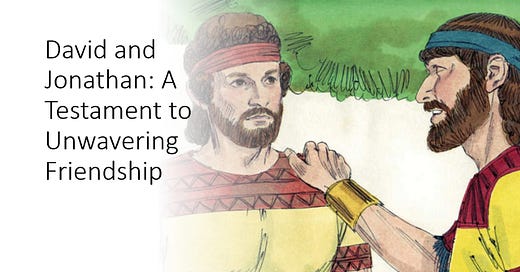David and Jonathan: A Testament to Unwavering Friendship
January 20, 2024, Saturday of the Second Week in Ordinary Time
2 Samuel 1:1-4, 11-12, 19, 23-27
Yesterday, in 1 Samuel 24, David spared King Saul's life, demonstrating his loyalty to God's anointed king despite Saul's pursuit of him. David spared Saul's life one more time in 1 Samuel 26, but then 1 Samuel 31 narrates the tragic death of Saul and his sons in the battle against the Philistines. Today, in our reading from 2 Samuel 1 this tragic news is brought to David by an Amalekite claiming that he had killed Saul at Saul's request. However, the account in 1 Samuel 31 disagrees with the Amalekite's claim. We are told there that witnessing the defeat of his army, Saul committed suicide on the battlefield (see 1 Samuel 31:5). In response to the news David executes the Amalekite for killing God's anointed and mourns Saul and Jonathan's deaths.
David's heartfelt lamentation in 2 Samuel 1:17-27 over the deaths of Saul and Jonathan reveals his genuine grief and respect. He mourns the loss of both the valiant Saul, Israel's former king, and his dear friend Jonathan highlighting their bravery in battle and the tragedy of their untimely deaths. David's sorrow is especially profound for Jonathan, expressing deep friendship and a sense of personal loss. David sings: "I grieve for you, Jonathan my brother! Most dear have you been to me; more precious have I held love for you than love for women" (2 Samuel 1:26). From their first encounter recorded in 1 Samuel 18:1, David found in Jonathan a friend in need. The writer tells us that "Jonathan loved [David] as his own soul" (1 Sam 18:1).
The bond between David and Jonathan is often regarded as one of the most profound and cherished friendships in history. What strikes many readers of that story is the fact that Jonathan, despite his rightful claim to the throne, formed an inseparable bond with David. Their friendship was built on mutual respect, support, and a covenant of love that surpassed societal expectations and personal ambitions. Jonathan even risked his safety to protect David from his father Saul's wrath. Their story symbolizes the essence of true friendship, marked by sacrifice, loyalty, and a profound connection that withstood trials and tribulations.
For the author of the Book of Sirach, a friendship that bonds David and Jonathan is a treasure and life-saving medicine. "Faithful friends are a sturdy shelter: whoever finds one has found a treasure. Faithful friends are beyond price; no amount can balance their worth. Faithful friends are life-saving medicine; and those who fear the Lord will find them" (Sirach 6:14-16). Thus, when we lose such a friend we lose something precious that brings deep pain into our hearts. As a king, David had many faithful servants but no more a friend like Jonathan.
Elie Wiesel wrote that "Friendship marks a life even more deeply than love. Love risks degenerating into obsession; friendship is never anything but sharing" and a Chinese proverb states that "a friend who understands you is better than a relative". The story of David and Jonathan's friendship teaches us that true friendship knows no boundaries, thriving amidst adversity and transcending personal ambitions. It also poses a question: do we have such friends and if not, why not? On the one hand, friendship comes as a blessing, very often unexpectedly in a person we meet for the first time. But, on the other hand, as Ralph Waldo Emerson said, "The only way to have a friend is to be one."




